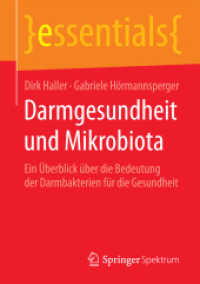- ホーム
- > 洋書
- > ドイツ書
- > Humanities, Arts & Music
- > Linguistics
- > slavic linguistics
Description
(Text)
This book is written in Russian .
This book is written for those Russian readers who unjustly pronounced Hippius a typical "Decadent". Canards describing her personality and eccentric behavior were coined and used repeatedly; Critical remarks were passed from person to person without examination: her "sins" and "heresy" were decidedly exaggerated. It is unfortunate that such criticasters were sufficiently powerful to establish a negative tone that has persisted and prevented a fresh approach to an analysis of Hippius the artist. Since Zinaida Hippius belongs to the world by virtue of her artistic talent, an effort has been made in this book to reveal the originality of her personal and poetic universe. She engendered new ideas, took an active part in a spirited exchange of opinions, and played a vital role in the religious renaissance at the beginning of the twentieth century. Always striving toward some spiritual ideal, she stimulated aspirations in writers, composers, artists, and philosophers.
(Table of content)
Contents: Zinaida Hippius's verse abounds in unexpected and ingenious parallels, contrasts, oxymorons, and comparisons, which are interlaced with details taken both from Russian folklore and from the most recondite philosophical, psychological, and theological thought. The solemn emotional overtones of her essentially tragic poems are often relieved by a delightful play of intellect and occasional sophistry. Hippius was one of the most stimulating minds of her time.
(Author portrait)
The Author: Temira Pachmuss is Professor of Russian Literature at the University of Illinois in Urbana. Her writings on Russian literature are voluminous. She received the medal of honor, the Order of the White Star, from the Republic of Estonia in 2001 for her meritorious contribution to literary scholarship.







